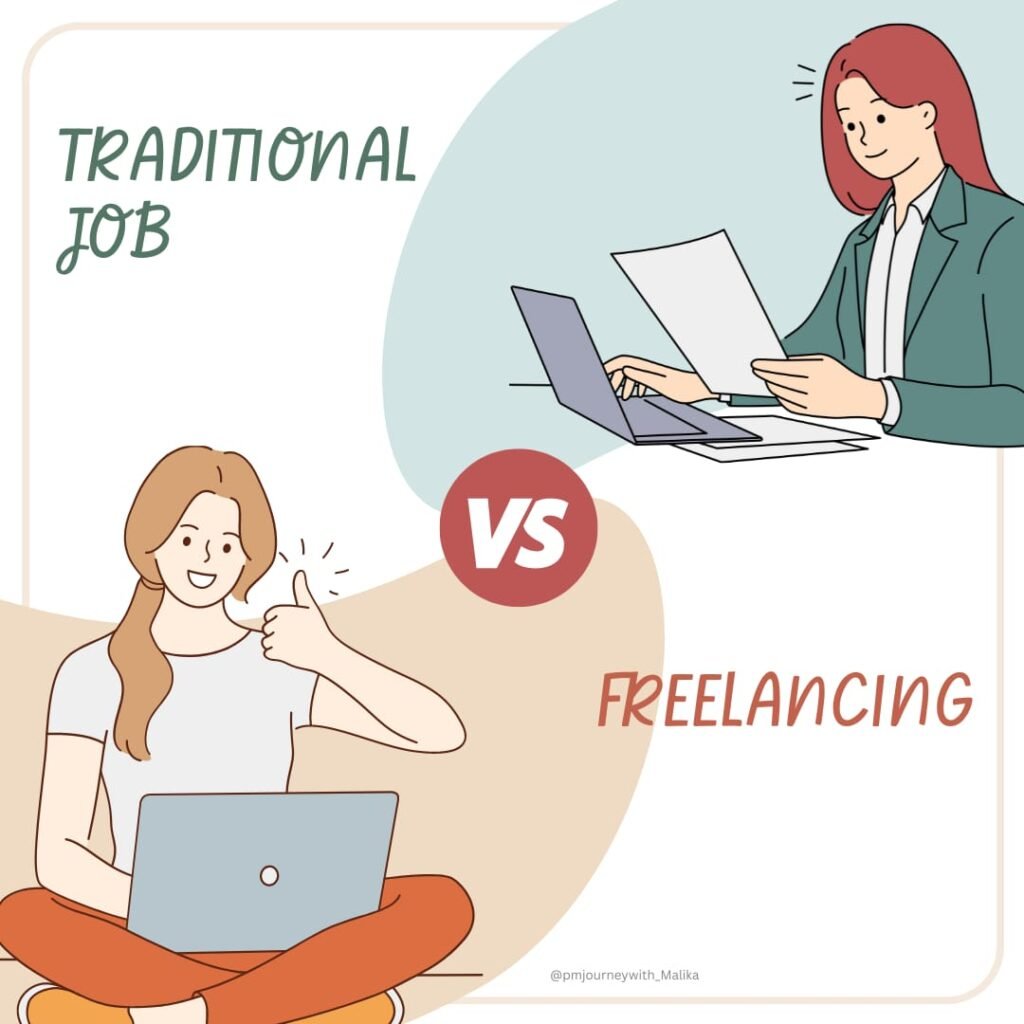Table of Contents
Introduction
Choosing between a traditional job and freelancing can be tough, especially in the field of product management. This blog will help you understand the pros and cons of both paths so you can decide which one suits you best.
Understanding Product Management
Product managers are responsible for the strategy, roadmap, and feature definition of a product. They work with different teams to make sure the product meets customer needs and business goals.
The Benefits of a Traditional Job in Product Management
Stability and Predictable Income
A traditional job offers financial stability with a steady paycheck and benefits like health insurance, retirement plans, and paid time off.
Access to Resources and Tools
Companies provide various resources, including specialized tools and support teams, enhancing productivity and product quality.
Career Growth and Networking Opportunities
Traditional jobs often have clear career progression paths and opportunities for professional development. You can network with colleagues, mentors, and industry professionals.
Structured Work Environment
A traditional job offers a structured environment with set working hours, helping maintain a work-life balance and providing routine.

The Advantages of Freelancing in Product Management
Flexibility and Autonomy
Freelancing allows you to choose your projects, clients, and working hours. This flexibility helps balance work with personal commitments.
Diverse Experience
Freelancers work on various projects across different industries, enhancing skills and broadening expertise in product management.
Potential for Higher Earnings
Freelancers can earn more than traditional employees, especially with specialized skills and a strong reputation. You set your rates and take on multiple projects.
Building a Personal Brand
Freelancing helps you build a personal brand and establish yourself as an expert, leading to more opportunities and recognition.

Challenges of a Traditional Job
Limited Flexibility
Traditional jobs come with set working hours and less flexibility, which might not suit everyone.
Office Politics and Bureaucracy
Navigating office politics and bureaucratic processes can be frustrating and hinder productivity.
Risk of Job Loss
Economic downturns or company restructuring can lead to job insecurity and layoffs.

Challenges of Freelancing
Inconsistent Income
Freelancing can lead to fluctuating income, making financial planning challenging. There may be periods with little or no work.
Lack of Benefits
Freelancers do not receive traditional employment benefits, increasing personal expenses and financial risk.
Self-Discipline Required
Freelancers must be highly self-motivated and disciplined to manage time, meet deadlines, and seek new projects.

Now I Have Some Questions for you.
What Are Your Career Goals?
Understanding your long-term goals can help determine whether a traditional job or freelancing aligns better with your aspirations.
How Do You Handle Uncertainty?
Consider your tolerance for financial and job security. Are you comfortable with the fluctuating income of freelancing, or do you prefer the stability of a traditional job?
What Is Your Work Style?
Reflect on your preferred work environment. Do you thrive in a structured, team-oriented setting, or excel in a flexible, self-directed role?
What Skills and Resources Do You Have?
Assess your skills and resources. Do you have the expertise and network to succeed as a freelancer, or would you benefit from the support provided by a company?
Are You Prepared for Continuous Learning?
Both traditional jobs and freelancing require continuous learning. Are you ready to invest in your professional development?
How Important Are Benefits to You?
Evaluate the importance of benefits like health insurance, retirement plans, and paid leave. Are these critical for you, or are you willing to forego them for the flexibility of freelancing?
Real-Life Examples
Example 1: Nupur, the Traditional Employee
Nupur has been a product manager at a tech company for five years. She enjoys the stability and benefits of her job, the structured environment, and access to resources that help her excel. Jane values the career growth opportunities and relationships with colleagues and mentors.
Example 2: Rakesh, the Freelancer
Rakesh started as a traditional employee but switched to freelancing. He appreciates the flexibility and autonomy freelancing offers. John works on diverse projects, significantly broadening his skills and experience. Despite challenges like inconsistent income, John thrives on independence and choosing projects that align with his interests.
Tips for Transitioning into Freelancing and Vice-Versa
Build a Financial Cushion
Ensure you have enough savings to cover expenses during the transition period, especially when moving from a stable job to freelancing.
Develop a Strong Network
Cultivate relationships with industry professionals, attend events, and join online communities to expand your network.
Enhance Your Skill Set
Continuously invest in your professional development through courses, workshops, and staying updated with industry trends.
Create a Personal Brand
Build a personal brand by sharing knowledge through blogs, social media, and speaking engagements to establish yourself as an expert.
Seek Mentorship
Identify experienced professionals in your network who can offer guidance and support.




